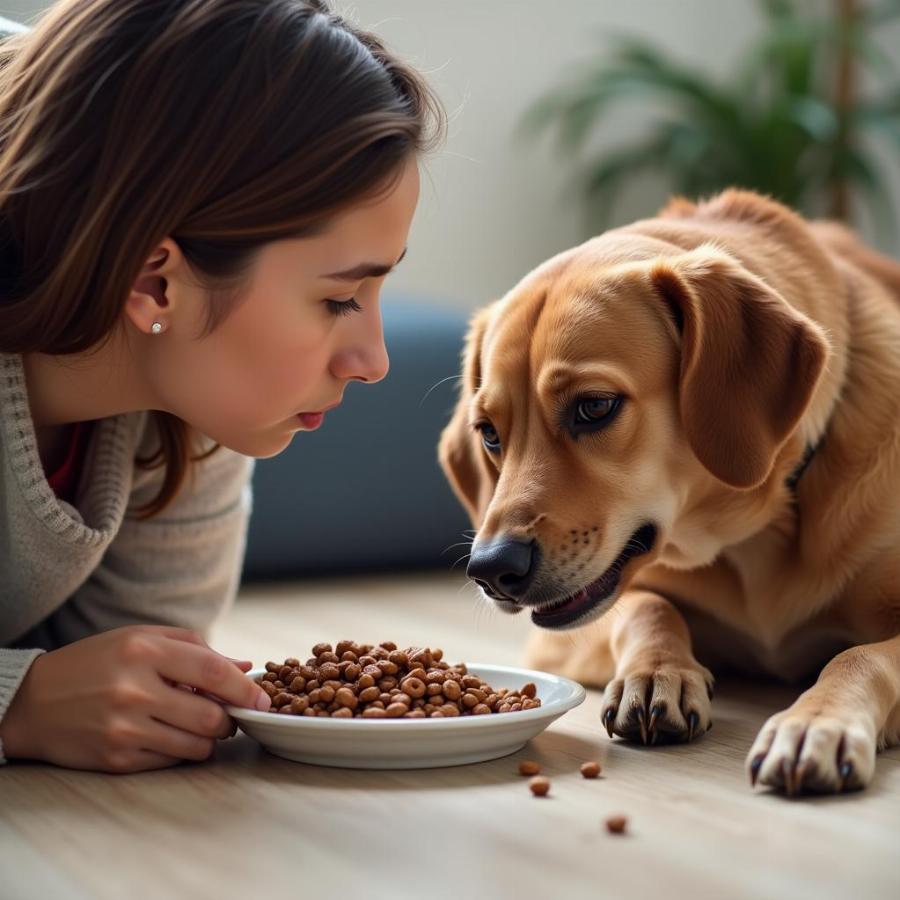A dog’s ability to survive without food is a serious concern for any owner. While the question “how long can a dog go without food before dying” is alarming, understanding the factors involved is crucial for responsible pet ownership. This article will delve into the complexities of canine starvation, exploring the dangers, the influencing factors, and the vital signs to watch out for.
Understanding Canine Starvation
Dogs, like all living creatures, require sustenance to survive. Food provides the necessary energy for bodily functions, organ health, and overall well-being. Depriving a dog of food for an extended period can lead to severe health consequences and, ultimately, death. While a healthy adult dog can technically survive for several days, even weeks, without food, this is a dangerous situation that should never be intentionally tested. The actual timeframe depends on various factors, which we will discuss below.
 Chó không ăn
Chó không ăn
Factors Influencing Survival Time
Several factors can influence how long a dog can survive without food. These include:
- Age: Puppies and senior dogs are more vulnerable to the effects of starvation due to their weaker immune systems and lower body fat reserves.
- Breed and Size: Larger breeds tend to have more fat reserves, potentially allowing them to survive slightly longer than smaller breeds.
- Overall Health: Pre-existing health conditions can significantly reduce a dog’s ability to withstand starvation.
- Hydration: Access to water plays a crucial role. A dog can survive much longer without food if it has access to clean water. Dehydration is a much more immediate threat than starvation.
- Environmental Conditions: Extreme temperatures, both hot and cold, can exacerbate the effects of starvation.
Danger Signs of Starvation
Recognizing the signs of starvation is vital for prompt intervention. These signs can include:
- Lethargy and Weakness: A starving dog will exhibit decreased energy levels and a reluctance to move.
- Weight Loss: Significant weight loss is an obvious indicator of starvation.
- Muscle Wasting: As the body breaks down muscle tissue for energy, the dog will appear thinner, and bones may become more prominent.
- Dull Coat: A healthy dog has a shiny coat. Starvation can lead to a dull, dry, and brittle coat.
- Changes in Behavior: Starvation can cause irritability, aggression, or unusual submissiveness.
What to Do If Your Dog Isn’t Eating
If your dog refuses to eat for more than 24 hours, consult a veterinarian immediately. They can diagnose the underlying cause of the lack of appetite and recommend appropriate treatment. Never attempt to force-feed your dog or administer medications without veterinary guidance.
How Long Can a Puppy Go Without Food?
Puppies are particularly vulnerable to starvation due to their rapid growth and high metabolic rates. They should never be left without food for more than 12 hours. If a puppy refuses food, consult a veterinarian immediately.
How Long Can a Senior Dog Go Without Food?
Senior dogs are also at higher risk due to potential underlying health issues and decreased body fat. If a senior dog refuses food for more than 24 hours, a veterinary examination is crucial.
Conclusion
While understanding how long a dog can go without food before dying is important, the focus should always be on prevention. Providing your dog with a balanced diet, fresh water, and regular veterinary care is essential for their health and well-being. Never intentionally withhold food from your dog. If your dog is exhibiting signs of starvation or refuses to eat, seek immediate veterinary attention.
FAQs
-
What is the most immediate threat to a dog without access to food and water? Dehydration is a more immediate threat than starvation.
-
Can a dog survive on water alone? While water is crucial, it cannot provide the necessary nutrients for long-term survival.
-
Why is my dog not eating? Loss of appetite in dogs can have various causes, including illness, stress, dental problems, or simply disliking their food.
-
Should I force-feed my dog if it’s not eating? No, never force-feed your dog without veterinary guidance.
-
What should I do if my puppy isn’t eating? Consult a veterinarian immediately if a puppy refuses food.
Beaut Dogs: Your Partner in Canine Care
Beaut Dogs is your one-stop resource for all things dog-related, providing reliable, helpful, and in-depth information about the canine world. We offer a wealth of knowledge on breed characteristics, personality traits, and care requirements for a wide variety of dogs. Visit https://beautdogs.com today to explore the wonderful world of dogs and learn how to care for them best. When you need assistance, please contact us at Email: [email protected] to get detailed and accurate answers from Beaut Dogs.